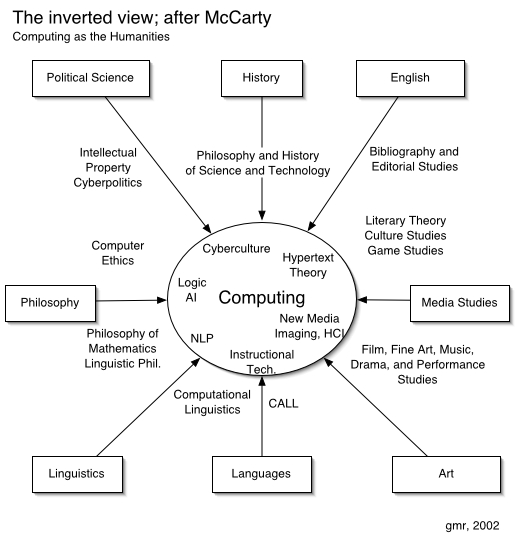Academic Commons is a new online forum around technology in liberal arts education. It is sponsored by the Center of Inquiry in the Liberal Arts at Wabash College, which makes it sound like a local initiative that is being scaled up into a pseudo-journal.
Continue reading Academic Commons
Category: Humanities Computing
Digital Medievalist
Digitalmedievalist.org is a new site for medievalists working with new media. It has news, a wiki, forums and a journal that will be coming on stream soon. Daniel O’Donnell at Lethbridge is one of the people behind it. I particularly like the clean design of the site. Daniel tells me they have not had luck getting people to edit wiki pages which doesn’t bode well for academic wikis.
How much information? 2003
How Much Information? 2003 is a new version of How Much Information? 2000. They both try to estimate how much information was produced and in what form (from magnetic media to film.) These reports are thorough and fascinating.
Continue reading How much information? 2003
Computing or Humanities?
From Humanist, an essay on Computing or Humanities? The Growth and Development of Humanities Computing which mentions what is happening at King’s and Willard McCarty and Harold Short’s map of a Methodological Commons.
I tend to take a very different view where Humanities Computing is not an area of computing methods and tools useful to the humanities, but a discipline that brings humanities inquiry to and through computing. The radical idea I would put forward is that computing (or at least multimedia) is a new discipline of the humanities that draws on traditions of the more established disciplines.
AHDS Methods Network
The aim of the ICT Methods Network will be to promote and disseminate the use of ICT in UK Arts and Humanities research in order to enhance, develop and make more effective the process of research, and to communicate research outcomes more widely and efficiently. It will focus on new developments and advanced methodologies, on research processes, questions, and methods, and on uses of data, rather than on data creation and preservation or access to resources.
The English Arts and Humanities Research Board is developing a ICT Methods Network which will disseminate information about digital methodologies in the arts and humanities. I’m not sure what this will mean, but it could be a welcome turn to looking at the interpretation (quesitons and intepretative practices) of digital matter.
Humanities Computing Challenges
At the HC Summit at UCIC John Unsworth asked us to reflect on the challenges that the humanities computing faces. Here is my list taken from the discussion:
- Learning and Training
- Dissemination and Publication
- Methods and Tools
- Crafting Theory
HC Summit, Illinois: Trip Report
This weekend I have been at a summit around humanities computing at the University of Illinois that was organized by John Unsworth, Orville Vernon Burton and the folks at the NCSA.
One difference between HC in the US on the one hand and HC in Canada and Europe on the other, is that in the US there hasn’t been a national organization that could help organize the various centres for the purpose of presenting ideas to national funding agencies. (Perhaps the ACH once functioned that way, but now it is international.) One set of questions we discussed was the need, the scope, and the activities a national (US) gathering. I also got a quick tour through a number of NCSA initiatives of interest to humanities computing. The following are some of those of interest.
Continue reading HC Summit, Illinois: Trip Report
Victoria Manifesto
In June of 2004 a small group of us were gathered at the University of Victoria at a Humanities Computing Summer Institute organized by Raymond Siemens. In the Curriculum Development Seminar, Ray called for a Victoria Manifesto which we never got around to writing. Below is my response to that call modulated by reading Henry and Susan Giroux. It isn’t, on the surface, about humanities computing learning/programs, but it is meant as a prologomena. I hope to write corollaries that flesh out the implications for computing in the arts and humanities.
1. A university is a public space that is supported by and for dialogue in civil society.
A university is not a free market or in a free market where entities compete for clients, though it preserves free access to ideas. Any market is a combination of constraints (rules, laws, and culture) that creates an opening for cooperation and competition in a particular field. A university is such a combination of constraints that free up time and space for intellectual activity.
The university predates current neoliberal triumphalist declarations about the virtues of blind markets. The university will survive neoliberalism because without constructs like a university we would have no constraints such that there was freedom or market.
2. A public space is one where you can enter into dialogue with others.
Dialogue is not a neutral activity. To enter into dialogue you have to acknowledge the other’s voice, you have to acknowledge the other as other, and you have to converse in the open, as if anyone could listen in. There is no victory in dialogue, only entering in voice and leaving in silence. Dialogue does not solve problems, it allows voices to confront each other in public and shame themselves. Dialogue passes time, it creates a pace and site where the conversation is foregrounded instead of methods, solutions, and victory.
3. The humanities are those disciplines in a tradition of critical dialogue.
The humanities are disciplines that maintain dialogues past, participate in dialogues present, and prepare the ground for dialogues to come. To maintain a dialogue is to keep it present, to participate in dialogue is to be willing to participate in public, and to prepare for dialogue is to provoke response.
4. The humanities in dialogue must attend to discourse in all its forms.
We prepare ourselves for discourse by learning to articulate. We teach and learn articulate expression as creative practices.
That means we learn to be critical of discourse and its forms, including our own. In particular it means we have responsibility to engage new forms and the claims made about new forms.
The humanities are not the disciplines of text, they are the disciplines of human expression. Human expression is the fabric of public discourse and the possibility for civil society. Whatever forms public culture takes, we gather with questions, art, and provocation.
5. To attend to discourse is to contribute to it.
The humanities are as much about the creation of art as its critique and documentation. There is a continuum between the arts and humanities artificially distinguished when we tried to become science. To understand a discourse you must experiment with it and that means experimenting with its transposition into other forms.
At the same time we need forms with which to discuss others. It is understandable that we would privilege particular forms for discussion-about in order to gather, but we need to be vigilant that our gathering is not an end itself.
6. Dialogue is open.
The humanities, in so far as they are committed to dialogue, are committed to open access. Open access to the public, of which we are part, is a condition for dialogue as dialogue. Without access dialogue is no more than private conversation. The humanities, therefore, must attend to openness and accessibility, and continually ask what they could be.
7. New media is neither. What has been valued is not, again.
To foster dialogue is to acknowledge what has been said before and what will be said again. We recover how what has been said without closing the possibility of appropriate intervention. The recovery is a distortion, but all interventions are.
The humanities are not teleological disciplines that advance knowledge, except within local contexts through researched reminder, creative practices, and transposition. The humanities have no particular method that guarantees incremental novelty, they are about the very methods, heuristics, subcultures and techniques of expression that can be deployed for public discourse. For this reason we are neither new nor past, but we are interested in what should be new or past.
While the humanities are about recovering knowledge into dialogue they strive to do so in a way that encourages further dialogue as opposed to silencing dialogue with scholasticism. We are not the disciplines of “I told you so” nor do we adjudicate value. We don’t wait or stand above, but are entering in as others. The public is the eavesdropper on dialogue and continually its judge, not professional humanists, except in so far as we are in the public too.
Therefore we provoke dialogue about what is new and past with others, again. Thee is no us and them. No one cannot be a humanist if they choose to enter. The university strives to be open to those who choose, and civil about our limits.
8. What is at hand in discourse matters.
To participate in dialogue is to listen. We don’t just call for listening – that is to stand off and leave listening to others, but in listening actively we respond to what and how is said. We don’t grasp what is said at hand in order to fix it, but we respond in order to keep the dialogue going. That means recovering, learning, and adapting to multiple new media. Digital discourse is therefore now also our site. If we are silent and take no responsibility for its deployment, use and discourse then we relinquish our public role and retreat past. Discplines in dialogue create their future, ours is fully engaged in civil society and its various articulations.
Civil society, to paraphrase Ghandi, is a great idea. Its a shame we never live up to it, but a shame we acknowledge in the university through entering dialogue. Victoria is not ours, nor is it manifest, there is only shame and constraint against which we speak, again.
Nerbonne: Data Deluge
In June I blogged John Nerbonne’s plenary at the ACH (See Nerbonne Plenary.) He has put up the text of the talk on his web site, Papers (Preprint Versions) by John Nerbonne. See The Data Deluge. John makes a balanced, open and fair argument for starting with humanities questions and focusing on delivering results. He is open to the way the questions evolve when using computing, so his practice is not uninterested in new questions as long as they evolve from existing ones. The end of the essay reflects on the discipline of humanities computing and Willard McCarthy’s discussion of it. Where I differ is that I see an emerging set of questions around new media which we can also address and produce results. The “we” includes the arts – fields that have been transformed by computing differently. The results also differ when one is less of a science and more of an art – in fact there are few results in the form of answers – only interventions and exhibits. But, credible and responsive work whether you call it results or interventions, are still what keeps a field healthy and allows new questions to emerge. There is nothing worse than a field that just complains about being taken seriously without producing anything of interest outside its complaints.
Pictures from Sweden

Did you miss the ALLC/ACH conference? Well, to help you feel bad I have posted a site with photos of Gothenberg and some of the participants. See Images of 2004 ALLC/ACH Conference, Gotherberg, Sweden.
